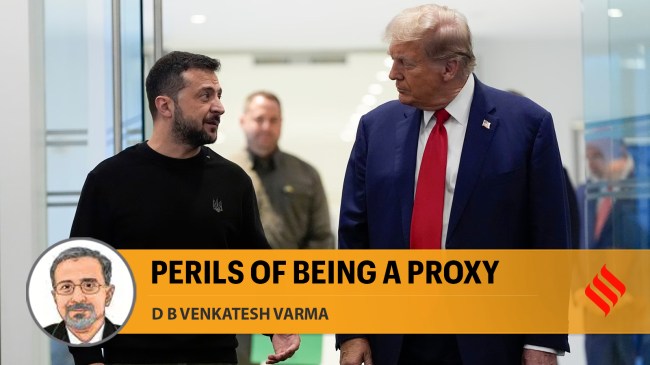Opinion In Ukraine tragedy, a lesson on big powers: Proxies always end up as doormats of history
In the realm of geopolitics, the quest for proxies is eternal, as must be our vigilance against it. Ukraine, sadly, is the living example of a dying proxy, its fate there for the whole world to see
 US President Donald Trump with Ukraine's President Volodymyr Zelenskyy (Source: AP Photo)
US President Donald Trump with Ukraine's President Volodymyr Zelenskyy (Source: AP Photo) Why do big powers do big resets? Because they can.
More has happened in US-Russia relations in the last three weeks than in the last three decades. After years of drifting towards conflict, the Lavrov-Rubio meeting last week in Riyadh reset the geopolitical springs with a click that has resonated the world over. Just as light bends towards gravity, in the long arc of power, geopolitical logic tends to bend towards the big powers.
When agency is supreme, consequence becomes a matter of detail. And agency there is. In the US, it re-emerged with President Donald Trump’s vision for regeneration of American power, combining domestic ideology and external ambition. Articulated with remarkable clarity during his election campaign, the execution of this vision is now well underway. In Russia, it was patiently waiting in President Vladimir Putin’s conduct of the Ukraine conflict — not merely in terms of military tactics, but also in terms of a grand strategy aimed at preserving Russia’s position in the big power league, even if it is the weakest among them. This patience is now paying dividends, but in a form few expected. The green shoots of the US-Russian rapprochement are sprouting in the larger crucible of American imperial outreach, as it repositions itself against China.
The US-Russia engagement is about Ukraine, but also much more. Three years of direct military conflict has produced a stalemate that can be broken only to Russia’s advantage. This was always Moscow’s objective, and is now the reigning assessment in Washington, arrived at independently of what Ukraine might say and what the Europeans might think. America will not abandon Europe, which it now dominates, even as it abandons the three-decade policy of pretending that Russia can be excluded from Europe. Russia needs a peace settlement and has accumulated substantial leverage to shape its desired outcome. Negotiations will be hard and difficult but the tide has turned.
Policy choices have consequences. Ukraine chose to be a proxy of the US and Europe in its confrontation with Russia — a path travelled with deliberation since 2002, and militaristic determination since 2014. And the consequences have been devastating — loss of territory, decimation of a generation and the country’s uncertain future, at the mercy of patrons far and near. External abandonment will hasten national exhaustion. Having suffered the destruction of battle, Ukraine now awaits the harsh penalties of peace. Tragically, proxies always end up as the doormats of history.
Outrage can never be policy. There is consternation in Europe and attempts at a pushback. With cohesion built at the expense of coherence, Europe as a strategic entity has been in disrepair for a while. France and Germany, its real centre of gravity, have been hobbled by a shrill war group in NATO, which the US, its main benefactor, has been unable to discipline until now. With its defence capabilities hollowed out, its territorial commitments doubled and its political economy in crisis, European NATO has risen rapidly to the top slot of being the biggest burden on American global strategy. To expect that America would imperil its global interests for a defunct European policy would be unwise and, as it turns out for Ukraine and its benefactors, fatal.
The Ukraine tragedy should be an eye opener about the ongoing global power play. This was a world of make-believe — notions of American omnipotence and benevolence, inevitability of permanent conflict with Russia, visions of dual containment against Russia and China and a policy paralysis in Europe whose cover was so pervasive that even fanciful EU documents, such as those on its Indo-Pacific policy, were celebrated widely, including in Delhi’s think-tank salons. This was an age where our quick embrace of the lingo of Western dominance, in terms of concepts and frameworks, was sometimes cringe-worthy.
Mercifully, that miasma is now lifting. Between fast changing ground realities and rapid-fire pronouncements from Washington, the familiar world is getting buried. Despite the current turbulence, India has much to gain from greater geopolitical balance on the Eurasian continent and more dynamic global energy and technology markets — two positive outcomes of an America re-engaging with Russia. The turbulence itself should prod us to jettison some of the fanciful notions in our strategic discourse – external balancing as a diplomatic force-multiplier and interoperability with foreign powers as a compensator for filling military deterrence gaps with China. In the realm of geopolitics, the quest for proxies is eternal, as must be our vigilance against it. Ukraine, sadly, is the living example of a dying proxy, its fate there for the whole world to see.
The writer is former ambassador of India to the Russian Federation (2018-21).
He has written this column on the Ukraine conflict annually since 2022




